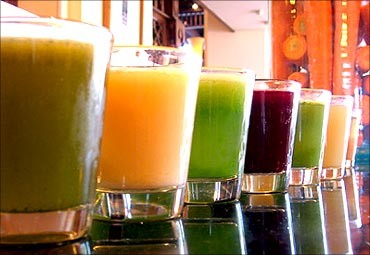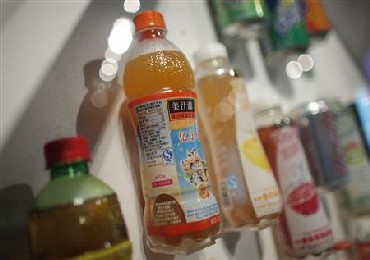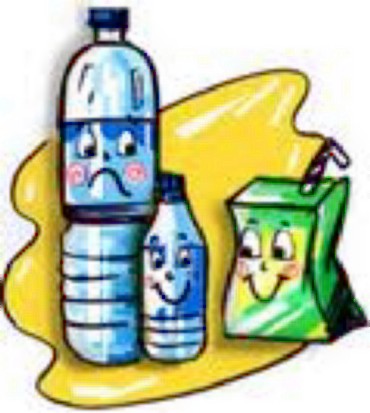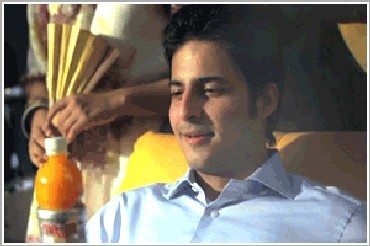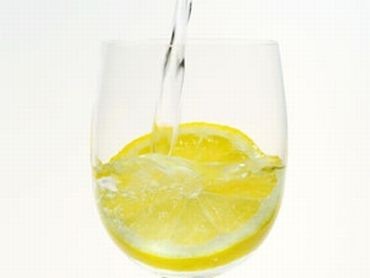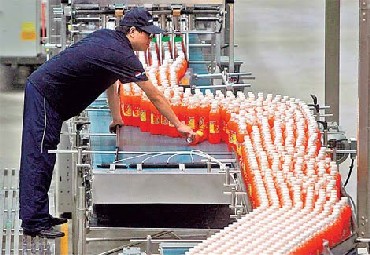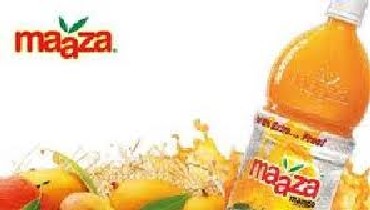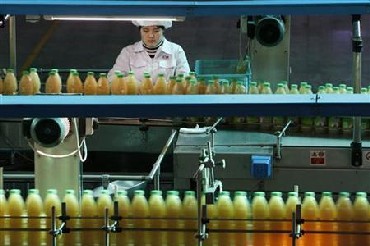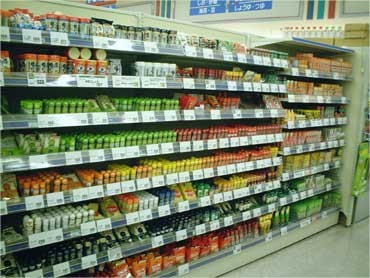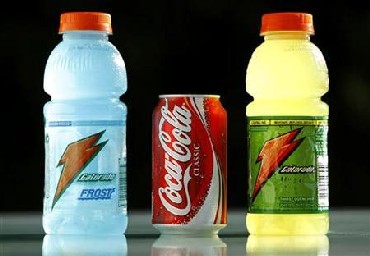 | « Back to article | Print this article |
Why cola majors are focusing on non-fizzy drinks
This is that time of the year. With the mercury soaring upwards, beverage makers are pulling out all stops to stay ahead of the game.
From new product launches, high-decibel advertising to improved distribution and retail display - it's a no holds barred fight for market share out there.
The heroes this time are the alternative beverages, those ubiquitous juices and other fruit-based drinks that are overwhelming store shelves.
Riding on a strong health trend, both Coca-Cola and Pepsi have been strengthening their non-carbonated offerings in India for some years now.
Click NEXT to read more...
Why cola majors are focusing on non-fizzy drinks
Coca-Cola recently entered the Rs 500-crore (Rs 5-billion) juice market with a line extension of Minute Maid, to take on rival Pepsi's Tropicana.
Big Bazaar's private label Tasty Treat is on a different trajectory, and has added flavours like litchi, apple, guava and mixed fruit to its repertoire.
Regional player CavinKare has been toying with the idea of taking its regional brand (Maa) national for some time now. It has doubled its capacity.
The opportunity in juices is immense. Of the Rs 3,500-crore (Rs 35-billion) non-carbonated beverages market, fruit-based drinks stand at Rs 3,000 crore (Rs 30 billion), while fruit nectars and juices is still a small category, valued at Rs 500 crore (Rs 5 billion).
In 2011, the non-carbonated beverage category is expected to outpace growth in the carbonated drinks category (14 per cent to 5.6 per cent), according to a Euromonitor study.
Click NEXT to read more...
Why cola majors are focusing on non-fizzy drinks
The juice category is the second-fastest growing part of the beverage industry after bottled water, say analysts.
Marketers believe the headroom for growth is huge - just look at the jostle in front of your neighbourhood juice shop for proof. PepsiCo India Director (juice and juice drinks) Homi Battiwalla believes repeat consumption, need for convenience and evolution of modern trade will give further impetus to this category.
While packaged fruit juices (having over 85 per cent fruit pulp) are trying to replace the chore of freshly squeezed juices at home, fruit-based drinks (less than 20 per cent pulp) and nectars (25-85 per cent pulp) like Coca-Cola's Maaza, Minute Maid Pulpy Orange and Nimboo Fresh, Pepsi's Slice and Nimbooz are trying to woo consumers with their promise of 'fresh' and 'natural'.
Click NEXT to read more...
Why cola majors are focusing on non-fizzy drinks
King of flavours
Mango continues to be the king of flavours in India with seven out of 10 drinks sold being mango flavoured.
Maaza (Coca-Cola) and Frooti (Parle Agro), are the oldest brands in the category.
While Maaza dominates the RGB (returnable glass bottles) format, Frooti's strength is the 200ml Tetra Pak. Maaza has been dabbling with a Tetra Pak offering, but hasn't been able to make much headway, notes an industry observer.
Besides focusing on their inherent strengths, both brands are aggressive on growing the PET format, which allows convenience and staggered consumption.
"We will shortly introduce a new pack (400ml) at Rs 22 in the PET format which is our biggest initiative for the year," says Ajay Bhatija, senior manager (juices), Coca-Cola India.
Click NEXT to read more...
Why cola majors are focusing on non-fizzy drinks
"Our research shows that between the 200ml RGB (returnable glass bottle) and 600ml PET bottle, there was no in-between pack meant for one person on-the-go. We piloted this last year, and will go pan India with the launch this year," adds Bhatija.
Pepsi's Slice has also launched a 350ml PET bottle at the same price point to tap the on-the-go market.
Parle Agro Joint Managing Director & Chief Marketing Officer Nadia Chauhan says the PET format has allowed Frooti to reach out to a larger universe of consumers.
"Frooti when available in only Tetra Pak packaging had a strong pull among kids. When we introduced the brand in PET in 2002, our target audience became housewives and young adults," says Chauhan.
Frooti sales, until some years ago, was skewed towards the Tetra Pak, but currently both formats (PET and Tetra Pak) contribute equally to sales.
Click NEXT to read more...
Why cola majors are focusing on non-fizzy drinks
Chauhan also observes that the 600ml pack which was previously driven by in-home consumption is now seeing a lot of out-of-home pick up.
"It has become like a sharing pack for youngsters and college students. Given that PET gives you the opportunity to recap the bottle it is a huge success among people on the go."
While the 200ml pack continues to be the volume driver across markets, the brand was the first to introduce 100ml juice in Tetra Pak packaging (in 2004) which is sold in many retail outlets, hung in a chain form.
This price point helped the brand penetrate deeper into the market," says Chauhan.
Besides refreshing their pack formats and prices for their mango drinks, beverage companies are focused on staying top-of-the-mind through new advertising messages.
While Maaza's theme is 'Jaldi kya hai', urging consumers to savour the goodness of mango at a leisurely pace, Frooti is continuing to build on the fun appeal of the brand through a commercial built around a reality show format.
Click NEXT to read more...
Why cola majors are focusing on non-fizzy drinks
"We organised a game show and the participants will be featured in 30 TVCs," says Chauhan. Frooti will also advertise during the Indian Premier League (IPL) this year.
Pepsi's Slice has upped the ante since roping in Katrina Kaif as ambassador for the brand. Pepsi's Slice, which was relaunched in 2008, is banking on a huge experiential sampling programme to drive sales.
"This category is driven by taste and we believe we need to reach out to consumers to taste our product," says Battiwala of PepsiCo.
Playing second fiddle
Lime is the second flavour brands are squeezing in fruit drinks. It is a flavour well accepted but most of the consumption is from the unorganised sector.
Both Coca-Cola and Pepsi have launched their lemon brands Minute Maid Nimbu Fresh and 7Up Nimbooz in the last two years.
Parle Agro's LMN brand, which is available in metros and mini-metros, is trying to increase visibility through institutional sales.
Click NEXT to read more...
Why cola majors are focusing on non-fizzy drinks
"Starting this year, we will be served in some airlines," says Chauhan. This year Chauhan will focus on improving trade distribution and LMN will not be advertised on-air.
While both Coca-Cola's Minute Maid and Pepsi's Nimbooz compare their brands to homemade 'nimboo pani' (lime water), Parle Agro's LMN is tactically trying to position the drink as a 'lemon-flavoured' drink to avoid comparison with homemade 'nimbo paani'.
Future Group Business Head (private brands) Devendra Chawla who has a decade of experience with the Coca-Cola company reasons: "Irrespective of the positioning each brand takes, it will be a while before lemon brands can win consumers over from the homemade nimboo paani or the ones prepared by roadside vendors. The consumption of these drinks is very strongly ingrained in our culture. So, it is clearly a strategy for the long haul."
To appeal to the younger generation who will be early adopters to this flavour, brands have to invest more in making their drinks taste more like the homemade nimboo paani, says Chawla.
Click NEXT to read more...
Why cola majors are focusing on non-fizzy drinks
In fruit-based drinks, flavours beyond mango and lime have not gained traction. Pepsi's Slice launched litchi, guava and orange a few years ago and withdrew it. Maaza too tested out other flavours like pineapple which did not appeal to Indian taste buds.
Parle Agro's Frooti experimented with orange and pineapple but withdrew them from shop shelves.
"Indian consumers have such a deep-rooted association of mango with Maaza and Frooti, that it will be a challenge to associate with other flavours," says Chawla.
Parle Agro is banking on Appy to build a strong apple franchise. The focus this year will be on multiple packs at different price points.
"Earlier we were present in only 200ml; but end of last year we launched multiple pack sizes - 100, 160, 250 and 400ml. This is also the first year that Appy will be advertising on television, during the IPL which will enable us to inform consumers about the new package and price points."
Click NEXT to read more...
Why cola majors are focusing on non-fizzy drinks
In fruit juices, Dabur Real leads the market with 52 per cent share while Pepsi's Tropicana has logged in 25 per cent.
Unlike fruit-based drinks, juices have seen an extension into many flavours. Dabur Real has 12 flavour offerings, while Tropicana has seven flavours.
A Euromonitor report says orange juice is the largest-selling flavour in fruit juices, but mixed fruit too is gaining ground.
For Dabur Real, the mixed fruit flavour sells the most, but the company is also looking to grow regional flavours like guava and sweet lime.
This year, the brand will also launch its fruit-fibre range in Bangalore and Maharasthra which it has been test-marketing since November 2010.
"This range of Real Active will help address the concern of consumers who believe juices are void of any fibre," adds a Dabur spokesperson.
Click NEXT to read more...
Why cola majors are focusing on non-fizzy drinks
While Dabur Real restyled its juice packaging a few months ago, shifting positioning from 'taste' to 'health', Parle Agro's Saint is pushing its brand through tie-ups with doctors.
"We arrange home delivery of juices for patients of certain doctors," says Chauhan. PepsiCo's Tropicana, on the other hand wants to own breakfast consumption and will continue with its positioning 'let's make breakfast 100 per cent'.
Fruit juices, unlike juice drink, is a small market because they have not been closeted by occasion, believes Davinder Singh, innovation consultant, Taru Innovations, who has worked with brands like CavinKare's Maa and Coca-Cola's Maaza.
"Fruit juices have been trying to position themselves on the health platform to be accompanied by meals, which is not a custom in most Indian households," he adds.
The acceptance of packaged juices as healthy has been another barrier, believe experts. "In-home consumption has been overruled by preparing juices at home, while outside of homes, juices compete with vendors who prepare fresh juice right in front of you from fresh fruit," adds Lubna Khan, associate vice-president (strategic planning), J Walter Thompson.
Click NEXT to read more...
Why cola majors are focusing on non-fizzy drinks
Battiwala of PepsiCo says consumers also like fruit juices sold on the street because it is garnished with masala (spices). Hence product-led innovation in this category is important.
Premium pricing has restricted consumption of juices to urban India. "Fruit juices are priced almost 20 per cent higher than fruit drinks. Also, the shelf life of fruit juice is much less owing to the absence of preservatives.
Hence the brand cannot reach rural pockets where electricity and refrigeration is an issue," explains a Dabur official.
"Unlike flavours like orange, a mango juice drink gives you the same mouth feel as juice nectar," says Mahesh Kanchan, vice-president (marketing), Godrej Hersheys Food and Beverages, which sells the Jumpin and XS brand of juices.
"Many consumers consume juice for the feel-good factor, rather than the do-good factor. So why would they pay extra for a 100 per cent apple juice versus an apple drink which tastes pretty much the same?" he adds.
Click NEXT to read more...
Why cola majors are focusing on non-fizzy drinks
Spencer's Retail General Manager Jagadish Ramadugu says unlike other categories, fruit juice sales through modern trade are very high.
"Modern trade is a format where the different flavour variants and brands can be showcased properly, allowing the consumer to understand his options," adds Ramadugu.
Dabur India Head of Marketing (foods division) Krishan Kumar Chutani says modern trade is a key point of sale for the company because it is a channel which is propelling the growth of the category.
"Much of the off take that happens through this channel is impulse and thus good visibility and sampling helps," he adds.
"While the attempt by most players, especially in modern trade, has been to generate offtake on the back of promotions, this is short term. Ultimately, it is the promise of taste and quality which will become the game changer," says Chutani.
Click NEXT to read more...
Why cola majors are focusing on non-fizzy drinks
At present, 30 per cent of Dabur Real sales come from modern trade, while 50 per cent is from general trade.
Given that the category is still at a nascent stage, marketing experts reckon brands have to work harder on their communication.
Adds Khan, "Brands have to go beyond the 'good for health' positioning. They need to build trust. Also, the category has to go beyond 'indulgence' and build brands on the promise of necessity. You have to justify to consumers why they should shell out the extra money to buy packaged juice."
"Despite the difference in classifications, in India the lines between juice drinks, beverage nectars and 100 per cent fruit juices are blurred. Consumers need to be educated," says Chawla.
Click NEXT to read more...
Why cola majors are focusing on non-fizzy drinks
He adds, "A consumer in a metro would understand the benefits of 100 per cent juice; but in small towns, the choice is driven by price and pack sizes."
Chawla adds, "Juices are the growth category of the future, and consumers will get recruited through a fruit drink and climb the ladder to the 100 per cent platform."
Evidently, after years of treating 'other' drinks as second-class beverages, cola majors are strengthening their non-cola offerings to derisk their portfolio.

